site search
online catalog
MAY 1, 1865, GREENSBORO PAROLE OF THOMAS J. CLAXTON, 13th TENNESSEE AND 2nd CONSOLIDATED TENNESSEE: SAW ACTION FROM SHILOH THROUGH THE CAROLINAS
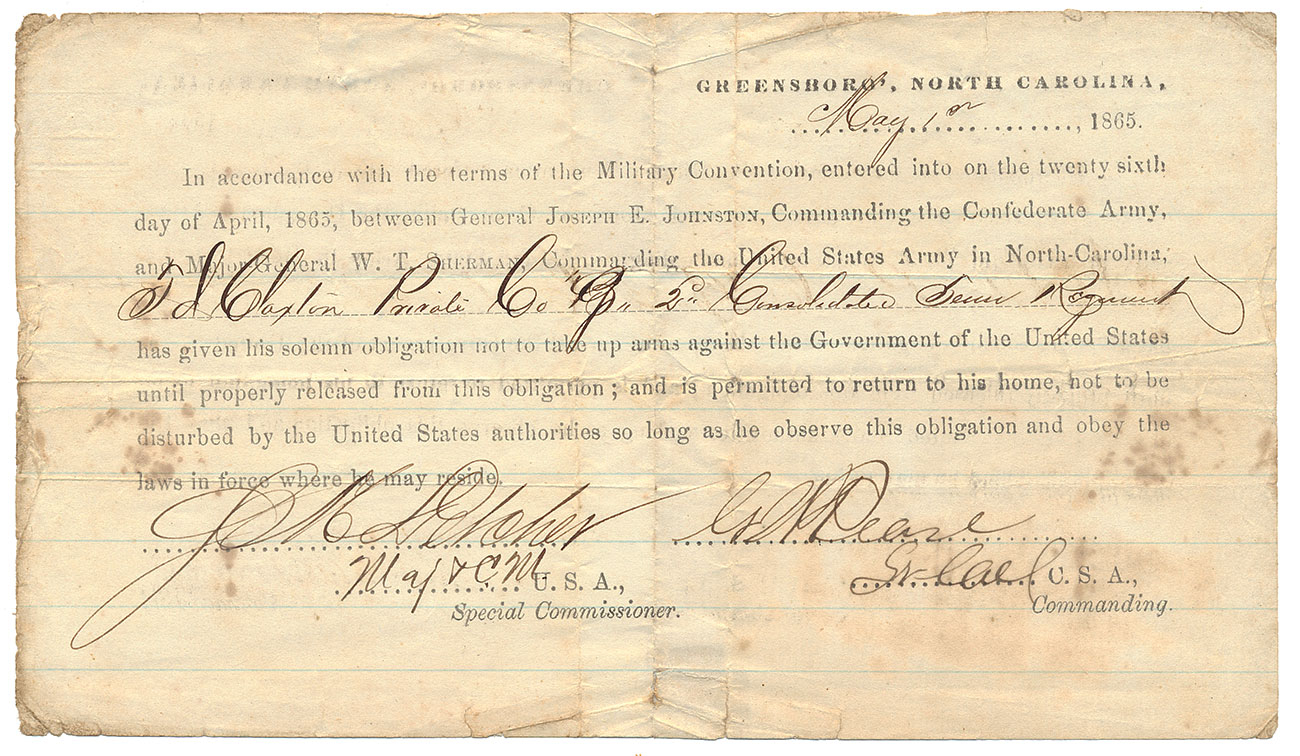
Hover to zoom

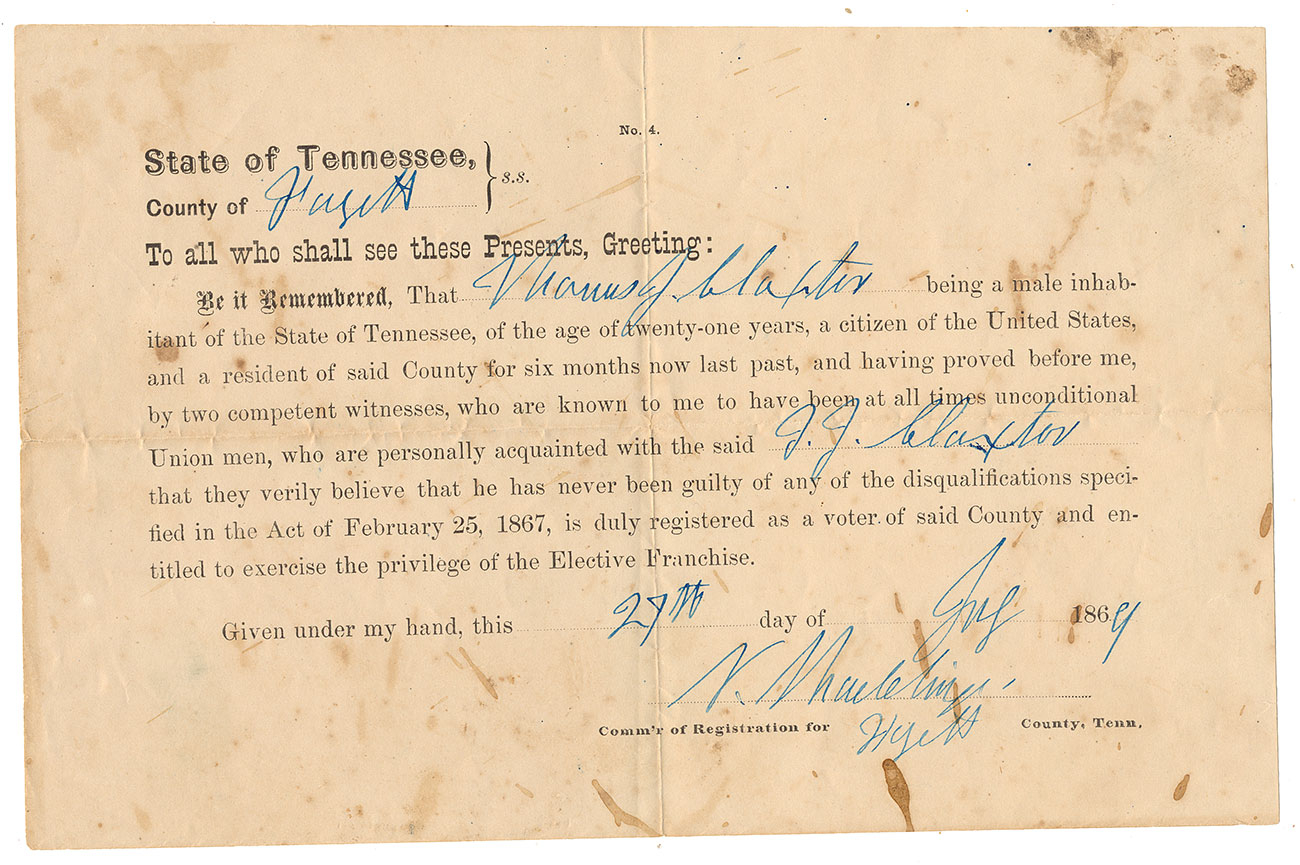
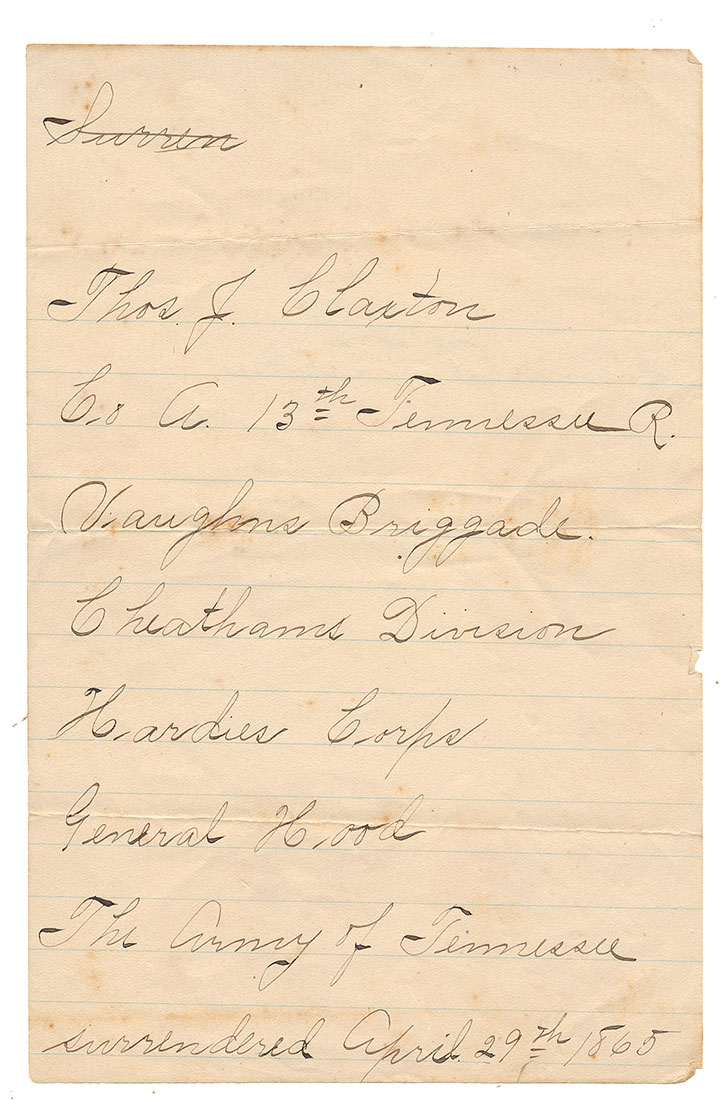
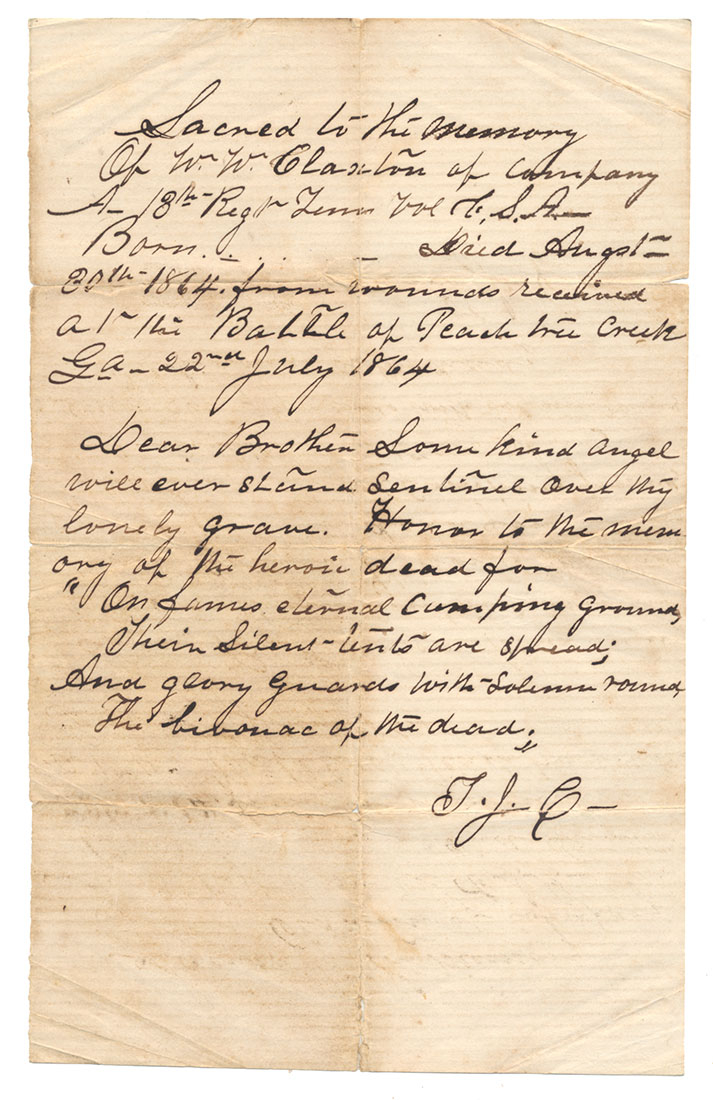
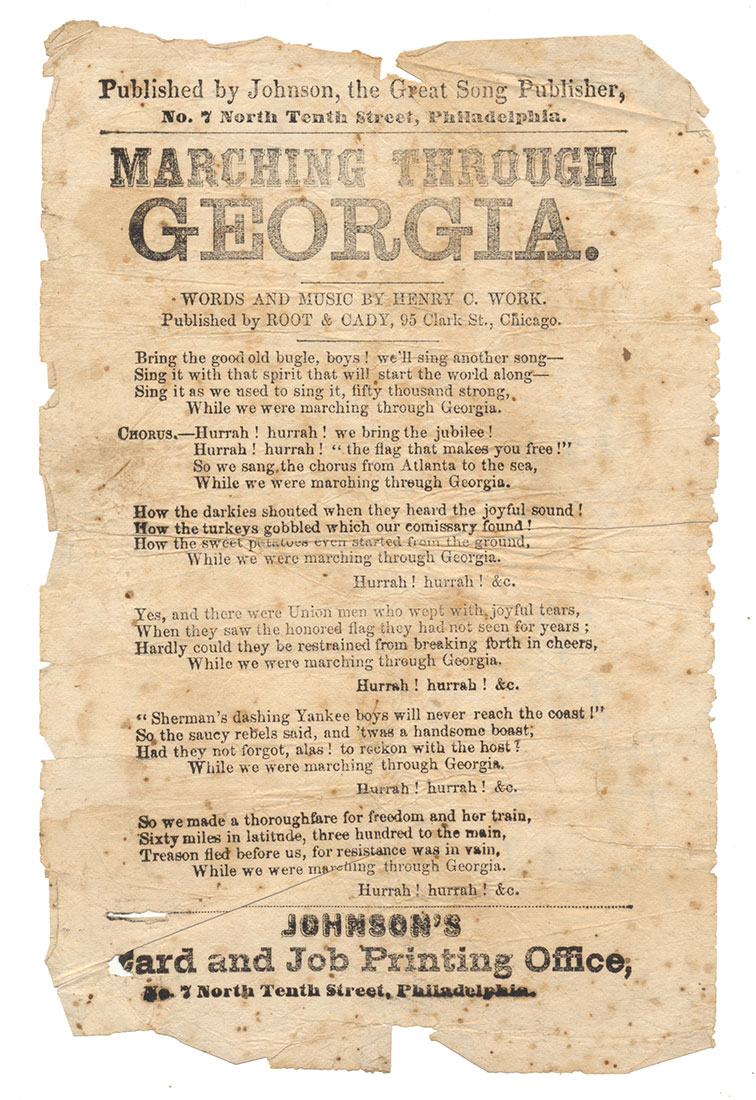
$2,750.00
Quantity Available: 1
Item Code: 1300-61
Shipping: Determined by Method & Location of buyer
To Order:
Call 717-334-0347,
Fax 717-334-5016, or E-mail
Excellent condition, scarce May 1, 1865, parole for Tennessee Confederate Thomas J. Claxton, who served in Co. A, 13th Tennessee from December 1861 to the surrender in 1865, with the regiment at the very end of the war consolidated with other Tennessee regiments due to heavy losses and redesignated the “2nd Consolidated Tennessee Regiment.” The parole is in excellent condition. We have noted the handwritten portions in square brackets:
Greensboro, North Carolina
[May 1st] 1865
In accordance with the terms of the Military Convention entered into on the twenty-sixth/ day of April, 1865, between General Joseph E. Johnston, Commanding the Confederate Army/ and Major-General W.T. Sherman, Commanding the United States Army in North Carolina,/ [TJ Claxton Private Co. 2d Consolidated Tenn Regiment]/ has given his solemn obligation not to take up arms against the Government of the United States / until properly released from this obligation; and is permitted to return to his home, and not be / disturbed by the United States authorities so long as he observe this obligation and obey the / laws in force where he may reside.
[S.M. Letcher] [G.W. Pease]
[Maj. & C.M.] U.S.A., [Lt. Col.], C.S.A
Special Commissioner Commanding
With the parole are some family papers. The most touching is a one page letter signed “T.J.C” lamenting his brother’s death from wounds: “Sacred to the memory of W.W. Claxton of Company A 13th Regt Tenn Vol CSA Born [ ] Died August 30th 1864 from wounds received at the Battle of Peach Tree Creek GA 22nd July 1864 / Dear Brother Some kind angel will ever stand sentinel over thy lonely grave. Honor to the memory of the heroic dead for “On fame’s eternal camping ground / Their silent tents are spread / And glory guards with solemn rounds / the bivouac of the dead.” The quoted poem by Theodore O’Hara dates about 1850 and found wide use in commemorating Civil War casualties, both North and South. This is on a small sheet that was folded several times and looks contemporary, possibly sent home by T.J. Claxton to the family. He has left his brother’s birthdate blank. Also include is a small newspaper clipping with a May 28 (1864) report of the battle at New Hope Church. A Philadelphia printer’s song sheet advertising “Marching Through Georgia,” July 27, 1869, voter registration certificate (testifying two “at all times unconditional Union men” believe he is not disqualified,) 1908 letter to Sallie Claxton, Treasurer of Joe Wheeler Chapter UDC, Stanton, TN, acknowledging contribution from the chapter for a statue, with receipt, from Anna B. Claxton
Thomas Jefferson Claxton was born March 15, 1835, in Tennessee. The 1850 census picks him up as one of 8 children of Physician William Willis Claxton in Gibson County, with Thomas among the four eldest sons, all listed as farmers. The 1860 census finds him in Fayette County working on a farm with older sister Jane and younger brother A.E. Claxton, usually referred to as Edward. Thomas enlists in Co. A of 13th Tennessee on Dec. 15, 1861, at Columbus, KY. The company had called themselves the Fayetteville Rifle Grays when organizing and originally were Company E but were redesignated when the regiment mustered into Confederate service in July 1861. When he enlisted in Company A, he joined younger brothers A.E., who had enlisted in May at Jackson, and Willis (W.W. Claxton) who had signed up in August. (There was also a G.W. Claxton in the company, whose relationship is unclear.) Records show him present throughout his service, though apparently on detached service as a hospital guard at Shelbyville at points from March to May 1863. He was promoted to Second Sergeant December 1, 1863.
The regiment had been organized and mustered into state service at Jackson, TN, on June 4, then moved to Randolph and on July 26 ordered to New Madrid, Missouri, where it was accepted into Confederate service and first saw action at Belmont, Missouri, on Nov. 7, losing some 149 men, with Company A suffering bearing the brunt: 54 by one account, though by another, 5 killed, 8 wounded, and 35 captured out of 54 present, with those captured soon after exchanged. The regiment was then posted to Columbus, KY, until the fall of Ft Donelson, withdrawing to Corinth, Mississippi, in late March. In April it fought in Russell’s brigade at Shiloh, losing 137. As part of Cheatham’s division, the regiment moved to Chattanooga and then was detached with the brigade to Knoxville to take part in the invasion of Kentucky, suffering 48 casualties at Richmond on Aug. 30. It rejoined the division in time to take part in Perryville but was in reserve. At Murfreesboro on Dec. 31 it lost 110 of 252 engaged. It went into winter quarters at Shelbyville and in March 1863 was consolidated with the 154th (Senior) Tennessee for field service but kept distinct regimental organizations, and saw heavy action at Chickamauga in September, reportedly capturing 300 men and the regimental colors of the 77th Pennsylvania, They fought again at Missionary Ridge on November 25, were in the winter camps at Dalton until May 1864 when they took part in the Atlanta Campaign. After the fall of Atlanta, they were with Hood in Tennessee, fighting at Franklin and Nashville, then joining Johnston in the Carolinas. Losses made necessary the further consolidation of the regiment with more Tennessee regiments in late 1864 and yet again in April 1865, with the combined force then designated the 2nd Consolidated Tennessee Regiment, and the 13th forming Companies G and H of that unit. Claxton is thus listed as in that regiment when paroled at Greensboro.
As shown by his parole, he served from his enlistment through to the end of the war. He is listed as present on all the muster rolls in his file, though on detached service in Jan-Feb 1863, perhaps as a hospital guard, which is noted on his May 1863 return. He is specifically credited with taking part in the Battle of Shiloh (part of an effort to compile of roll of honor) and was promoted to Second Sergeant Dec. 1, 1863. In addition to Shiloh, his service would have included also Corinth, Richmond, Perryville, Murfreesboro, the Tullahoma Campaign, Chickamauga, the Chattanooga Campaign, the Atlanta Campaign, Franklin, Nashville, and the Carolinas. His surrender and parole are recorded on extant records. His service, however, was not without cost. Brother A.E. Claxton had been discharged in July 1862, but brother Willis was mortally wounded in the Atlanta Campaign, dying August 30 at Catoosa, GA, from the, “effects of gunshot wounds,” according to a surgeon’s certificate, with the note that, “His effects were delivered to his brother,” presumably Thomas, and perhaps sent home with the eulogy in this lot.
Thomas Claxton returned to Fayette County, where he continued farming, married in 1866, and is listed in the 1880 census with his wife and four sons. He passed away in 1889.
With the papers comes an extensive research file compiled by the respected collector author from whom we obtained the lot. [sr] [ph:L]
~~~~~~~~~~~~~~~~~~~~~~~~~~~~~~~~~~~
THIS ITEM, AS WITH ALL OTHER ITEMS AVAILABLE ON OUR WEB SITE,
MAY BE PURCHASED THROUGH OUR LAYAWAY PROGRAM.
CLICK HERE FOR OUR POLICIES AND TERMS.
THANK YOU!
Inquire About MAY 1, 1865, GREENSBORO PAROLE OF THOMAS J. CLAXTON, 13th TENNESSEE AND 2nd CONSOLIDATED TENNESSEE: SAW ACTION FROM SHILOH THROUGH THE CAROLINAS
Most Popular
Historical Firearms Stolen From The National Civil War Museum In Harrisburg, Pa »
Theft From Gravesite Of Gen. John Reynolds »
Selection Of Unframed Prints By Don Troiani »
Fine Condition Brass Infantry Bugle Insignia »
featured item
A BEYOND RARE CS ARKANSAS FROCK COAT AND "BONNET DE POLICE"
Mr. Ray Richey, owner of the Texas Civil War Museum, purchased this uniform coat and hat directly from an Arkansas estate in 2003. Twenty-six years prior to this it was acquired from the Beneux Plantation in Mulberry, Arkansas. Positive… (1268-057). Learn More »


